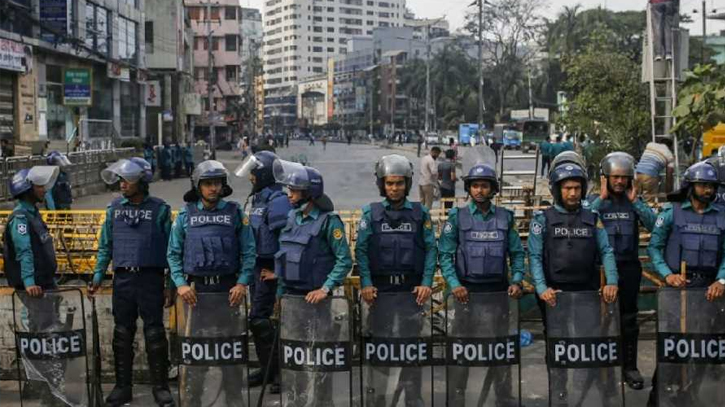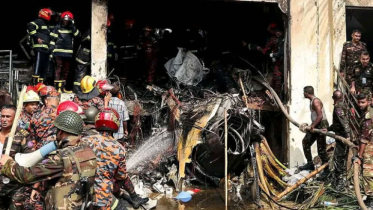
Photo: Collected
There is no provision for granting duty based on mental health evaluations. If any member or officer feels unwell and requests leave, it is granted. Specialised hospitals are available for the treatment of police personnel where they can address their health issues. Recently, the psychological aspects of a case involving a policeman shooting another policeman in Baridhara, Dhaka, have come under scrutiny.
In response, senior police officials have commented on the issue, sparking widespread criticism across the country since the diplomatic zone is a highly sensitive area where security is of utmost importance.
They noted that while the police force has made various improvements, there are no special psychologists for the police in our country, unlike in many other countries. However, they acknowledged that the psychological well-being of the police is an important issue that needs to be addressed.
When asked, DMP Additional Commissioner Dr Mahid Uddin stated that the incident of one policeman shooting another while on duty is undesirable. He suggested that the incident may have occurred due to Constable Kawsar's temporary excitement. When asked if the shooting was due to extra duty, he responded that such incidents can happen to anyone who loses control, but they are nonetheless unacceptable.
In response to a question about whether the policemen receive counseling, Dr Mahid Uddin mentioned that formal counseling is not conducted, although senior officers sometimes discuss these issues informally. He emphasised the need for a dedicated mental counseling unit within the police force, noting that police forces in developed countries have such systems. He added that when such problems arise during police briefings, appropriate actions are taken.
Police Constable Kawsar Ahmed fired 38 rounds at his colleague Constable Monirul Haque last Saturday night in the capital's Baridhara over an 'argument' in the diplomatic zone. Other colleagues on duty reported to their superiors that Constable Kawsar was behaving erratically after he shot his colleague. Additionally, Nilufa, Kawsar's wife, stated that Kawsar had mental health issues and had been officially treated at Pabna Mental Hospital at least three times. He was also taking medication regularly.
This incident has created widespread concern across the country. Questions have been raised about why a policeman with known mental health issues was assigned to duty in such an important and sensitive area as the diplomatic zone.
Dhaka Metropolitan Police Joint Commissioner Biplob Kumar Sarker referred to the incident as an accident and mentioned that an inquiry committee has been formed and is actively working on the case. He assured that the guilty will be punished.
Biplob Kumar said that after all, the police is a disciplined force with a strict chain of command. When a policeman's duty time comes, he must perform his duties as assigned. There is no opportunity to distribute duties based on an individual's mental condition. If any member feels unwell, they report it to their superior officer, who considers the matter and may grant leave.
Subsequently, the officer can seek treatment at Rajarbagh Hospital or any hospital of their choice, he added.
In response to a question, it was clarified that the area in question is a diplomatic zone, which has separate units. The officers there prepare the duty roster, and duties are distributed accordingly.
In this context, former Inspector General of Police Mohammad Nurul Huda emphasised the necessity of having a psychologist (mental health specialist) within the police force. He highlighted that police work is inherently stressful, with personnel at all levels enduring significant pressure. They must perform their duties amidst various adversities, making it crucial to address their mental health needs.
Huda warned that failing to manage stress and instability could lead to major incidents, citing the risk of events similar to the Gulshan attack.
Crime expert and Associate Professor at the Social Welfare and Research Institute of Dhaka University, Tawohidul Haque, emphasised that in a disciplined force where carrying and using weapons is involved, neglecting mental health is not an option. He noted that, as far as is known, the police force lacks an institutionalized psychologist or counseling system. There may also be a lack of regular monitoring or supervision of members. The occurrence of a tragic incident, such as the shooting of a colleague in Baridhara, suggests deficiencies in these areas.
Haque stressed the gravity of a situation where an individual entrusted with firearms to protect the public ends up causing harm. He pointed out that the irresponsibility of the responsible officers is also a significant factor in such incidents. Stress reduction is crucial, and timely action should be taken at the field level concerning the duty environment and mental health of policemen.
It is known that the police headquarters conducted a survey on the problems faced by constables in 2020. The survey revealed that 23.08 percent of constables considered not getting time off as a major problem in the profession. Similarly, 21.22 percent of Sub-Inspectors (SIs) shared this concern. Additionally, 12.82 percent of constables reported that they cannot spend enough time with their families, while 5.13 percent highlighted the issue of bad behaviour from politicians and senior officials in police stations. Another significant concern was raised by 24.32 percent of constables, who complained that leave is only granted if bribes are paid to the respective officer in charge (RI).
Furthermore, all the participating police personnel unanimously commented that the working hours should be reduced to 8 hours. Currently, police officers are entitled to 20 days of casual leave and 35 days of earned leave (earned leave) per year. In addition to casual and earned leave, police officers are entitled to 15 days of 'Rest and Recreation Leave' for three consecutive years. However, many police officers argue that a section of the police force is experiencing frustration due to excessive duty hours, inadequate leave, lack of promotion opportunities, and prolonged demotions. These factors contribute to a sense of dissatisfaction and demotivation among the affected personnel.
Messenger/Disha








